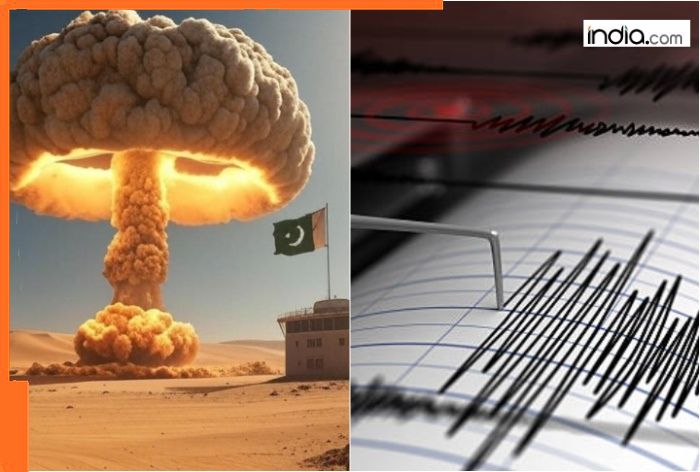World
Earthquakes in Pakistan Raise Speculations of Nuclear Tests

Two earthquakes struck different regions of Pakistan within the past week, raising speculations about the possibility of secret nuclear tests being conducted by the government in Islamabad. The first earthquake, measuring 4.6 on the Richter scale, occurred on October 1, 2023, at approximately 19:00 local time. This tremor struck at a depth of 10 meters and triggered panic among residents, prompting many to evacuate their homes. Fortunately, no casualties or significant damage were reported following the event.
Earlier in the week, on October 2, a smaller earthquake measuring 3.2 in magnitude was recorded near Karachi. This quake, which occurred at a depth of 10 kilometers and was located seven kilometers northwest of Malir, also caused alarm among residents in the region.
Experts Weigh In on Seismic Activity
Despite the heightened concern surrounding these seismic events, experts from the Pakistan Meteorological Department (PMD) and the National Seismological Center have stated that the recent tremors are consistent with natural geological activity rather than the result of a nuclear test. Seismological experts emphasize that earthquakes of lower magnitudes, such as those experienced, are common in the region and do not indicate any nuclear explosions.
On September 16, another earthquake measuring 4.5 struck Pakistan, adding to the timeline of seismic activity in the area. The frequency of these earthquakes has sparked discussions about the geological vulnerabilities of Pakistan.
Pakistan’s geological landscape places it within a seismic zone where the Indian and Eurasian tectonic plates converge. This unique positioning makes the nation particularly susceptible to earthquakes. Regions like Balochistan, Khyber Pakhtunkhwa, and Gilgit-Baltistan are especially prone to significant seismic events due to their proximity to major fault lines, including the Main Central Thrust. The provinces of Sindh and Punjab also experience tremors due to tectonic interactions.
Understanding Pakistan’s Earthquake Risks
The geological characteristics of Pakistan contribute to its status as one of the most earthquake-prone countries in the world. The combination of tectonic shifts and the historical prevalence of seismic activity underscores the ongoing risk faced by the population. Experts agree that while monitoring these events is crucial, the likelihood of nuclear tests being the cause of recent earthquakes remains unsubstantiated.
As the country navigates the complexities of natural disasters, it is essential for residents to stay informed and prepared for potential seismic activity. The recent earthquakes serve as a reminder of Pakistan’s vulnerabilities and the need for continued research into the region’s geological behavior.
In conclusion, while two earthquakes in quick succession have raised eyebrows regarding possible nuclear activities, expert analysis suggests these events are part of Pakistan’s regular seismic phenomena. Monitoring and understanding these natural occurrences remain vital for public safety and awareness.
-

 World5 months ago
World5 months agoSBI Announces QIP Floor Price at ₹811.05 Per Share
-

 Lifestyle5 months ago
Lifestyle5 months agoCept Unveils ₹3.1 Crore Urban Mobility Plan for Sustainable Growth
-

 Science4 months ago
Science4 months agoNew Blood Group Discovered in South Indian Woman at Rotary Centre
-

 World5 months ago
World5 months agoTorrential Rains Cause Flash Flooding in New York and New Jersey
-

 Top Stories5 months ago
Top Stories5 months agoKonkani Cultural Organisation to Host Pearl Jubilee in Abu Dhabi
-

 Sports4 months ago
Sports4 months agoBroad Advocates for Bowling Change Ahead of Final Test Against India
-

 Science5 months ago
Science5 months agoNothing Headphone 1 Review: A Bold Contender in Audio Design
-

 Top Stories5 months ago
Top Stories5 months agoAir India Crash Investigation Highlights Boeing Fuel Switch Concerns
-

 Business5 months ago
Business5 months agoIndian Stock Market Rebounds: Sensex and Nifty Rise After Four-Day Decline
-

 Sports4 months ago
Sports4 months agoCristian Totti Retires at 19: Pressure of Fame Takes Toll
-

 Politics5 months ago
Politics5 months agoAbandoned Doberman Finds New Home After Journey to Prague
-

 Top Stories5 months ago
Top Stories5 months agoPatna Bank Manager Abhishek Varun Found Dead in Well









